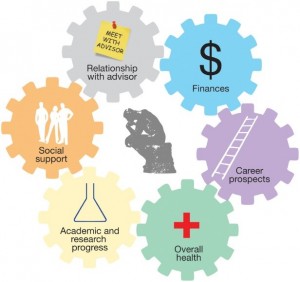If you are a new graduate student in the sciences, you will rotate through several labs during your first year at the University of Washington. Your challenge is to find the right lab for you — one that best matches your intellectual interests and that helps prepare you for your career.
How to get started in a lab
- Sample a range of lab environments and cultures. Find a lab that will help you develop as a researcher.
Find out what the ground rules and expectations are.
- How many hours are you expected to be in the lab? (Remember that research is not a 9 to 5 job; you should look forward to hanging out in the lab—but also make sure you know specific expectations for your time).
- What’s the definition of “progress” in lab work? What’s the definition of progress in graduate work in your discipline?
Look for opportunities that will benefit your career.
- Will you have an opportunity to publish?
- Will you get credit—as an author, co-author—for the work you do in the lab? Will your intellectual work really be your own? Seek a lab that gives ownership of your ideas to you.
- Will you have a chance to push beyond the boundaries of particular grants?
- Will you be able to collaborate with other labs?
Be smart.
- The best lab is not necessarily the one that pays the most.
- Success is not always about being comfortable— so look for a lab where you will be pushed a bit.
How to evaluate labs
Both established and new labs have great merit.
- In an established lab, find out: What’s the lab’s track record? Where have people ended up working after their lab experience?
- Recognize that some younger faculty—who do not have well established labs and therefore do not have the same track record as established labs—often bring the newest ideas to the discipline and are often willing to spend time with graduate students. Such labs might be a better place to try new things.
- Where do people in the lab publish? In top-tier journals?
- Ask other students about the labs.
- Trust your instincts.
Be clear about your own expectations for mentorship in a lab.
- How often would you like to meet with faculty mentors? (Make sure that the time you request is for the most pressing matters; don’t waste time on minor details that you can find out elsewhere).
- Can you get on the mentor’s calendar? (Ask other graduate students in the lab about the nature and extent of mentorship).
Make good use of your lab work: Publish early and publish often.
- Publications are the currency of success.
- Publications are a guaranteed path to a relatively carefree thesis preparation.
How to succeed in a lab
- Participation is the key to any successful lab. A successful lab draws on a variety of skills, so contribute.
- Recognize that a good lab is one with mutual mentorship; that means you need to contribute, too. As a first-year student, you may well have expertise that others in the lab don’t have. Be a good citizen; contribute the work. Recognize that you have the potential to be a valuable contributor from the very first day you walk in the door.
- Learn from others and support others in the lab. Recognize the expertise of all of your lab colleagues (faculty, visiting scientists, postdocs, graduate students, undergraduates, and even high school students).
- During your first year, complete at least one research paper.
by Tom Daniel, professor, Biology
